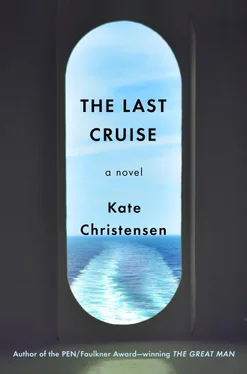Valerie left Christine’s side and inserted herself among them, claiming an empty deck chair in a circle of young women. Perched on the edge of the chair, she eased her notebook from her bag and opened it discreetly, scratching with her pen on a blank page to make sure it worked as she asked a question, listened to the answer. Christine watched from the doorway as Valerie began writing quickly, her usual chaotic discontent concentrated into one hard knot of purpose. The women seemed eager to have someone to talk to, someone who appeared to be on their side.
Christine thought of Lester and Camille below in the galley, how purposeful and sure they’d seemed to her. In contrast, these kids—as Christine thought of them, since most of them seemed well under thirty—looked defiant on the surface and nervous and scared underneath, unsure of everything. This was clearly not an ideological movement, politicized and telegraphed to a larger world. They seemed more like a provisional, loosely knit faction of strangers, bound by desperation and need. Christine felt uneasy, standing there where she didn’t belong, watching, with nothing to offer them but silent compassion.
The young woman Valerie had been talking to stood up and led Valerie over to another group, offering her a seat with them. One member of the group seemed already to know her: a wiry, striking, Hispanic-looking young woman Christine didn’t recognize. She started talking rapidly to Valerie, watching her intensely as Valerie wrote everything down, almost reading over her shoulder. Christine guessed this might be the same angry young female chef with the masculine-sounding name Valerie had interviewed a few days earlier. Christine was too far away to hear what they were saying, but she saw from the woman’s body language and the way the others seemed to coalesce around her, paying her close and respectful attention, that she was one of the leaders of the group.
Valerie buzzed back over to Christine. “They’re not giving in,” she said with quiet excitement. “Not until Larry Weiss agrees to negotiate with them. He’s refusing to even talk to them, so they’re at an impasse. I’m going to find this rich asshole and try to get a statement from him, anything I can use.”
“You’re getting involved?” Christine wanted to caution Valerie to leave this alone, but she knew it was useless. This was her job.
“Are you kidding?” said Valerie. “I have a frontline scoop on the first-ever official walkout on a cruise ship. Of course I’m getting involved! Want to come with me?”
“No thanks,” said Christine, feeling her old discomfort with the more predatory, brazen aspects of journalism. She left Valerie to her interviews and headed back to the galley, back into the flow of work again, back where she belonged.
*
When the emergency blasts sounded, one short followed by one long, Miriam was sitting in Isaac and Jakov’s cabin with Jakov, who wasn’t feeling well. Miriam suspected that he was suffering from heart trouble. He had been diagnosed with a bad heart several years before, and he’d been eating nothing but meat and cheese and buttery pastries for days.
“Do I have to go too?” he said as the instructions to go to their muster stations came over the PA system. “I don’t think I can stand up.”
“You stay here. I’ll say you’re sick and you went to the last one. Remember your muster station number?”
“Eight!”
The quartet had attended so many muster drills on so many cruise ships over the years, they could all put on life jackets automatically by now. Strapping hers on, Miriam made her way down to the assembly deck. Days ago, when they were still docked in Long Beach, the first muster drill had been festive, full of laughter and cheering. This time the mood was more grim. Miriam found Sasha and Isaac already wearing their life jackets, standing by the railing as their station leader took roll call and marked each name and cabin number off a list on a clipboard. The forty or so people assigned to Miriam’s lifeboat stood in a ragged, sticky mass. No one laughed or cheered. Several people tugged at their life jacket straps as if they suspected they were defective. Others peered with fretful skepticism over the railing at their lifeboat as if assessing its seaworthiness as well as the likelihood that they’d actually have to get in it.
When Jakov’s name was called, Miriam said, “He’s sick. He couldn’t make it.”
The young deck officer, an Asian boy in an orange safety vest, scowled at her as if Jakov’s absence were somehow her fault. “Everyone has to attend muster drills, ma’am,” he said with frosty admonishment.
“He can hardly stand up,” said Miriam. She heard an edge in her own voice. “He knows where to go and how to put on a vest.”
The officer ignored this and went on calling names.
“What a putz,” muttered Isaac in Miriam’s ear.
She was too stricken to laugh.
After lunch service was over, Mick left the galley and went down to his tiny cabin. He stripped off his clothes and wet himself thoroughly in a forbidden trickle in the shower, then turned off the water and lathered his hair and soaped and scrubbed his entire body. He rinsed off quickly, dried himself with a rough towel, put on a clean T-shirt and pair of checked pants, then his chef’s whites from the morning, and headed back to work. In the crew lounge, the ragtag members of his small galley crew had put together a hearty but sensibly expedient staff meal of whatever odds and ends were most likely to go bad first: day-old loaves of bread and a few ripe soft cheeses, kiwifruit and raspberries on the edge of spoiling, flats of smoked trout and salmon that had been opened already. The crewmembers were spread around the tables, popping open cans of cola and bottles of tea, eating and drinking ravenously and quickly, since they weren’t sure when their next meal would be.
Mick had never been in the crew lounge during the daytime. Sunlight filtered in through small high windows to reveal a shabby little foxhole, institutional-looking, with scuffed linoleum floors dusted with cigarette ash, greasy particleboard bar, smeared laminated tabletops. At night, in the glow of electric candles, it had felt almost romantic in here, certainly cozy, sitting elbow to elbow with his crewmates, getting drunk to loud music. Now it reminded Mick of a social room in a low-security prison. He felt a burst of anger, but at whom, he wasn’t sure. The cruise line? Consuelo? Bad luck? It felt older, deeper somehow. Maybe it was Suzanne, or his father. Maybe it was himself.
Mick sat alone and ate in silence, listening to the others talking amongst themselves. They were speculating about the crew who’d walked out, most of them with scorn that was nonetheless, Mick sensed, tinged with reluctant envy. We have to keep it together, he thought, glancing around. Over the years, he had heard stories from other crewmembers of minor disasters on cruise ships, engine fires, shipwide viruses, people falling overboard, ships stranded and floating without power for four or five days, food and water shortages. But the passengers were what worried him the most. Invariably, whenever things went bad, they turned into a bunch of angry, abusive, hysterical toddlers en masse, demanding immediate solutions from the overworked crew, making their lives a living hell. What was going to happen with half the crew already refusing to work? This was going to be a nightmare.
He glanced over at Christine. She was sitting with three young crewmembers, eating as fast as the rest of his crew, swilling iced tea and looking very American and out of place. She could have stayed upstairs, where she would have been taken care of, but instead she was down here in the hot galley with a motley bunch of cooks. And she looked unperturbed about it, relieved even. He felt a half-reluctant sense of kinship. This was exactly what he would have done in her place.
Читать дальше












